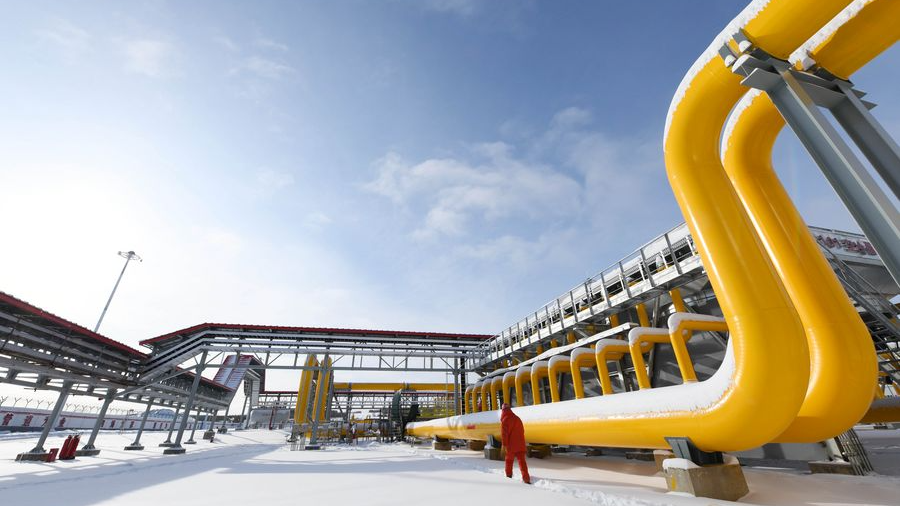By Sergei Lousianin
On June 28, 2021, Russian President Vladimir Putin and Chinese President Xi Jinping had a virtual meeting, adding new momentum to the deepening China-Russia comprehensive strategic partnership of coordination. With preparations underway for the celebrations of the 100th anniversary of the founding of the Communist Party of China (CPC), the two countries signed a joint declaration on the day of the meeting to extend The Treaty of Good-Neighborliness and Friendly Cooperation Between the People's Republic of China and the Russian Federation. In doing so, President Putin offered his sincere congratulations to President Xi, his reliable Chinese friend.
It is unfortunate that in 2021, the world is facing a number of challenges and tests ranging from the outbreak of the pandemic to conflicts between values and ideologies. Under the pressure of political and economic sanctions imposed by the "Western bloc" led by the U.S., Russia and China have to adapt to reality and remap certain strategic paths for global, regional and bilateral cooperation. Today, the two countries are working strenuously not only to protect the international legal system, uphold a multipolar world and support strategic arms control, but also to maintain global and regional balance of power. Both Russia and China are keenly aware of their special responsibilities towards the destiny and development of the world.
Russia-China cooperation is based on the two countries' strong and deep strategic partnership, which is currently experiencing profound changes, going into greater depth and reaching new heights. Such transformation is driven by internal factors such as the economic, cultural and civilizational closeness between the two countries at the people level, as well as external factors such as our shared goals to promote multipolarity, maintain global and regional security, defend national sovereignty and territorial integrity, and fend off other countries' intervention in our internal affairs.
Russia-China relations have long transcended the narrow, bilateral paradigm. Both countries are setters of global and regional agendas for the construction of a multipolar world, and defenders of international law and global governance institutions including the UN and its Security Council. The U.S. is obviously keen on sabotaging the international legal system and replacing it with a certain "code of conduct" for states formulated by itself to benefit Western countries at the expense of Russia's and China's interests.
Importantly, over the two decades since the Treaty was signed, China and Russia have put in place an effective mechanism to protect our common interests and uphold multilateralism as a major vessel for the solution of global issues. In the meantime, the two countries have also established a multi-level mechanism of strategic partnership, which involves bilateral cooperation at the levels of state, governments, social organizations, friendly groups, etc.
Within these mechanisms, high-level meetings are particularly relevant and valuable for the development of bilateral relations. They provide the political power that is needed to address bottlenecks in our partnership and pave the way for the short- and long-term planning of bilateral agendas in key areas (political diplomacy, military strategies, military technologies, commerce and economy, and humanitarian causes).
Meetings between Russian and Chinese leaders also contribute significantly to accelerating the solution of international and regional issues. The Eurasia high speed railway, built under Russia-China cooperation, is a result of highest-level negotiations between the two countries.

A staff member walks past pipelines in a section of the China-Russia east-route natural gas pipeline in Heihe, northeast China's Heilongjiang Province, November 19, 2019. [Photo/Xinhua]
On May 8, 2015, Russia and China signed the Joint statement between the Russian Federation and the People's Republic of China on cooperation in construction of conjugation of the Eurasian Economic Union and the Silk Road Economic Belt, showcasing their willingness to link the Eurasian Economic Union with China's Belt and Road Initiative, promote common development, and expand room for cooperation among European and Asian countries.
Moreover, it is also highly important to coordinate efforts within the framework of Russia-China leader-level meetings for the solution of pressing issues regarding Syria and Afghanistan, especially the withdrawal of U.S. troops, as well as of other problems such as those related to the Korean Peninsula and the Iran nuclear deal.
This year marks the 20th anniversary of the founding of the Shanghai Cooperation Organization, a regionalized grouping that has been closely followed by the leaders of our two countries. Russia and China are also both BRICS countries.
Bilateral ties between Russia and China are built upon intensive and diverse political, economic and people-to-people connections, the two countries' central positions on the global stage as independent and prominent powers, and the great resilience of our partnership as demonstrated in solving international and regional issues. Although affected by the COVID-19 pandemic, Russia-China cooperation remains flexible enough to integrate strategic interests with partnership opportunities.
Today's world needs a new form of bilateral military and political collaborations. Given the high degree of mutual trust and the existing cooperation in military technologies, it is actually not necessary for Russia and China to form a military alliance.
The relationship between the two countries, which has gone beyond the traditional sense of regionalized grouping, is fully self-reliant, independent from ideologies and not targeted at any other country. It is, both in nature and in form, a strategic partnership that is more effective than a traditional coalition.
The extension of the Treaty shows that leaders on both sides have worked to maintain high quality Russia-China cooperation at the legal and political levels. It also speaks of the significant roles they have played in bettering the shared future of our two countries and promoting global stability and development.
The author is a professor at the Moscow State Institute of International Relations, and a professor at the National Research University – Higher School of Economics.

 中文
中文



